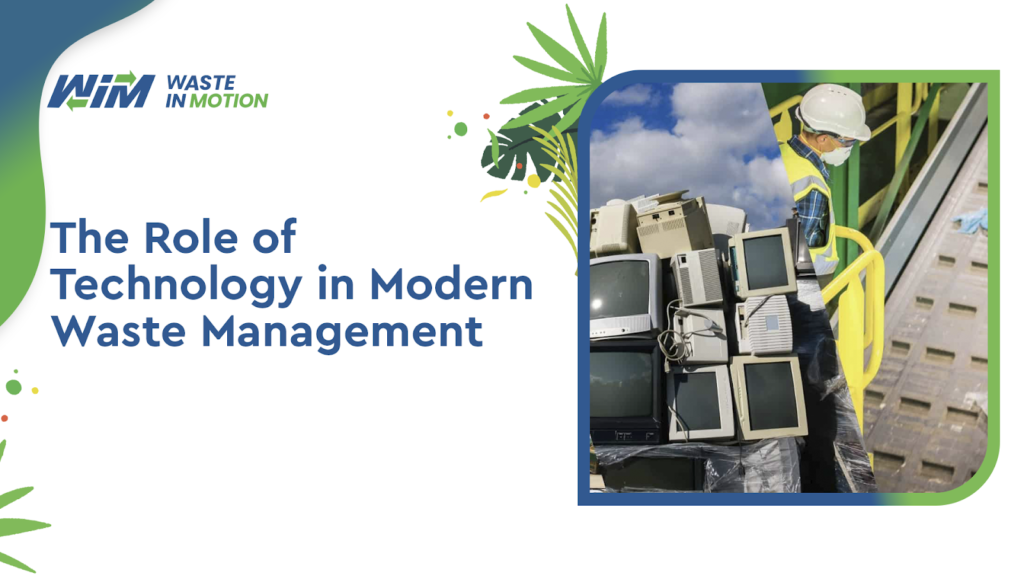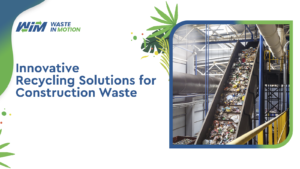Table of Contents
ToggleHow Technology is Transforming Waste Management
In today’s world, technology in waste management is revolutionizing the way we handle and dispose of waste. Advanced smart waste solutions are reducing environmental impact, increasing efficiency, and optimizing collection processes. With the integration of IoT in waste management, businesses and municipalities can track waste production and disposal in real time, leading to better decision-making. Learn more about the importance of effective waste management.
Smart Waste Collection Systems
IoT Sensors for Real-Time Waste Monitoring
IoT in waste management has introduced smart sensors that monitor waste levels in bins and dumpsters. These sensors help optimize collection schedules, ensuring bins are only emptied when necessary, reducing fuel consumption and operational costs.
Automated Waste Collection Vehicles
Automated waste collection vehicles use robotics and AI to streamline waste collection. They help reduce labor-intensive tasks, improve worker safety, and enhance efficiency. These technologies align with sustainable waste disposal practices.

AI and Machine Learning in Recycling
AI-Powered Waste Sorting Technology
AI in recycling is improving waste sorting through automation. AI-driven sorting machines can differentiate between recyclable and non-recyclable materials, increasing recycling rates and reducing contamination.
Data-Driven Waste Management Solutions
Predictive Analytics for Waste Reduction
Data-driven waste management uses predictive analytics to forecast waste generation patterns, enabling proactive waste reduction strategies. Businesses can optimize resources by leveraging data insights.
GPS and Route Optimization for Collection Services
Waste tracking systems equipped with GPS technology help optimize waste collection routes, reducing fuel consumption and enhancing operational efficiency. Learn about the business benefits of efficient waste disposal.

Ready to Lead the Future of Waste Management?
Join the movement for a smarter, cleaner planet! Partner with Waste In Motion and leverage cutting-edge waste management automation solutions for a greener tomorrow.
🔗 Explore Smart Waste Solutions ♻️
The Role of Robotics in Waste Processing
Robotic systems are transforming waste processing by automating sorting, shredding, and material recovery. These innovations improve efficiency, reduce human exposure to hazardous waste, and enhance recycling outcomes.
Sustainable Waste Disposal Through Innovation
Waste-to-Energy Technologies
Innovative sustainable waste disposal solutions such as waste-to-energy technologies convert waste into usable energy, reducing landfill reliance and generating renewable power.
Blockchain for Waste Tracking and Transparency
Blockchain technology ensures transparency in waste tracking systems, allowing authorities to monitor waste disposal activities and enforce regulatory compliance.
Challenges and Future Trends in Waste Management Technology
Despite technological advancements, challenges such as high implementation costs and infrastructure limitations persist. However, emerging trends like AI advancements and smart bin networks promise continued improvement in technology in waste management.
Conclusion
The integration of technology in waste management is essential for creating efficient and sustainable waste disposal systems. From automated waste collection to AI in recycling, technological innovations are shaping a cleaner future. Stay updated on industry trends with insights like front-load vs. rear-load dumpsters guide and how Moloks work.
Looking to optimize your waste management strategies with cutting-edge technology? Contact us at Waste In Motion to learn how our innovative solutions can help your business achieve greater efficiency and sustainability.
FAQs
-
How does IoT improve waste management?
IoT in waste management enables real-time monitoring, optimized collection schedules, and reduced operational costs.
-
What are smart waste solutions?
Smart waste solutions include AI-powered sorting, IoT sensors, and automated collection vehicles that enhance efficiency.
-
How does AI contribute to recycling?
AI in recycling improves waste sorting accuracy, reducing contamination and increasing recycling rates.
-
What is waste-to-energy technology?
Waste-to-energy technology converts waste materials into electricity or heat, reducing landfill use and promoting sustainable waste disposal.
-
How does blockchain improve waste management?
Blockchain technology enhances waste tracking systems, ensuring transparency and regulatory compliance.






